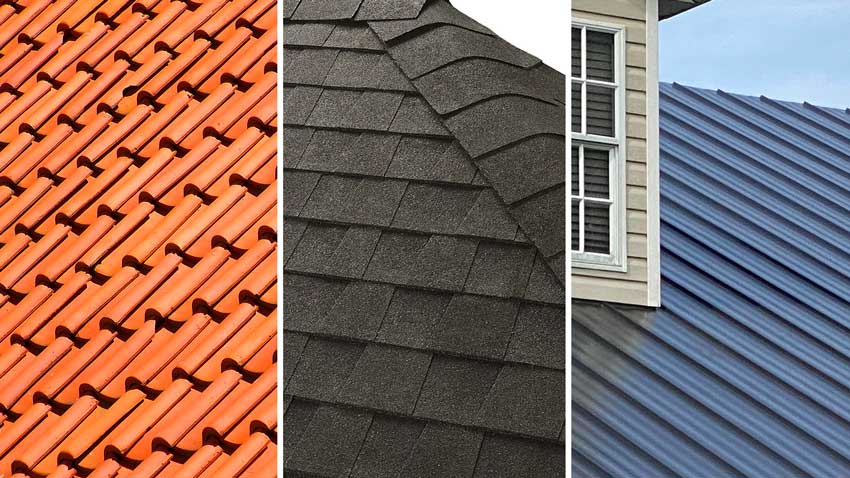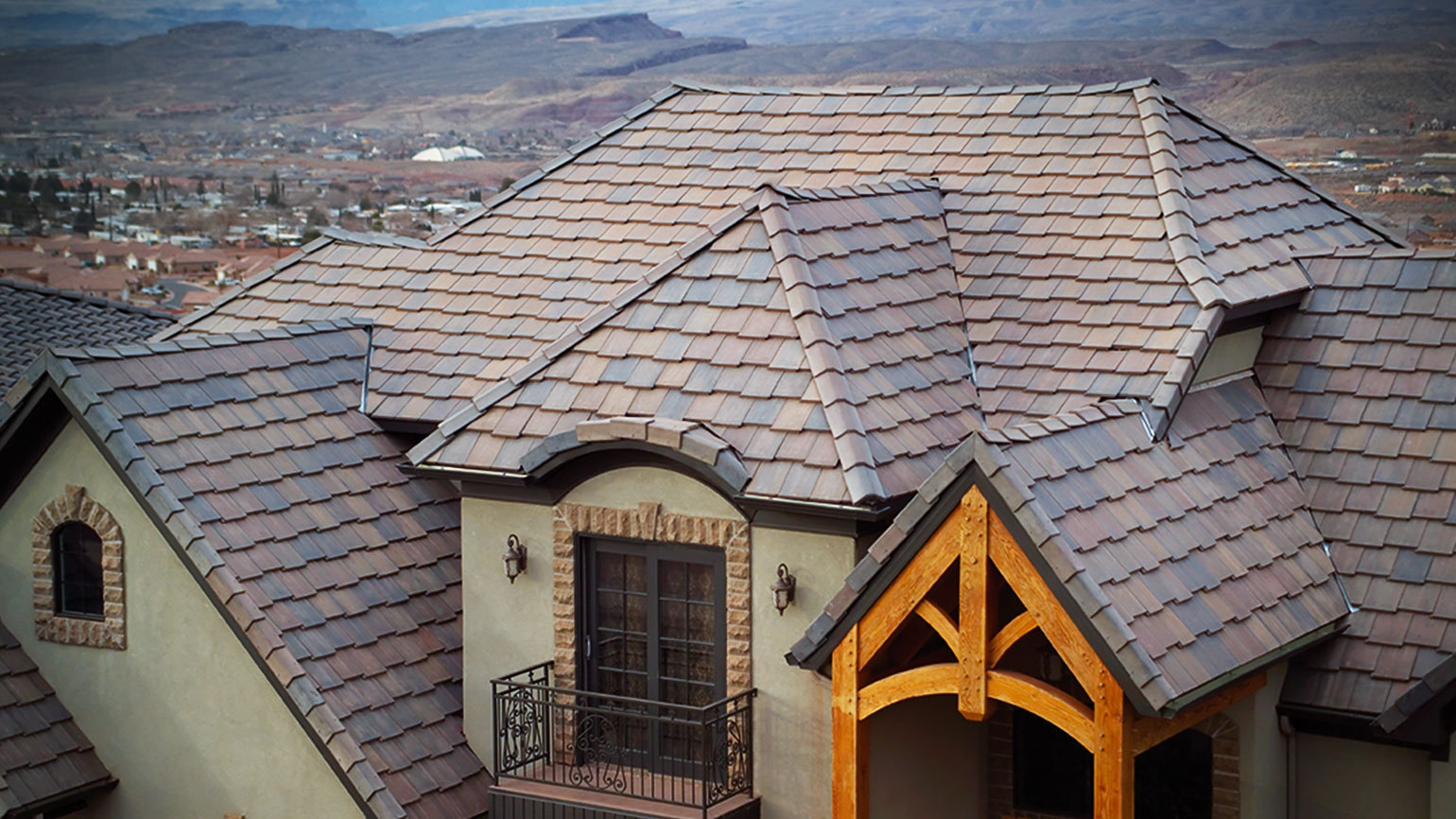Asphalt roof tiles are cost-effective and easy to install, while concrete tiles offer durability and energy efficiency. Choosing the right roofing material depends on factors like climate, budget, and aesthetic preferences.
Selecting between asphalt and concrete roof tiles is crucial for homeowners considering a roof replacement or new construction. Both materials bring distinct benefits to the table. Asphalt tiles, known for their affordability and versatility, accommodate a variety of styles and can reduce upfront costs.
On the other hand, concrete tiles stand out for their longevity and ability to improve a home’s energy efficiency, which can lead to savings over time. With this decision impacting both the protection of a home and its overall appearance, it’s essential to weigh these advantages to determine the best fit for your roofing needs.
Asphalt Vs. Concrete Roof Tiles Overview
When it comes to selecting the proper roofing material for your home, two popular choices often come to mind: asphalt and concrete roof tiles. Both materials offer unique benefits and characteristics that cater to different needs and preferences. In this comparison, we delve into the specific features of each roofing option to assist you in making an informed decision.
Key characteristics of asphalt roof tilesKey Characteristics Of Asphalt Roof Tiles
Asphalt roof tiles, known for their versatility and cost-effectiveness, are a common choice amongst homeowners. Here are the key characteristics that define asphalt roofing:
- Lightweight: They are easier to install and put less strain on the roof structure.
- Cost-effective: Asphalt tiles typically offer a more economical upfront cost compared to concrete tiles.
- Design Variety: Available in a wide range of colors and styles to match different architectural designs.
- Weather Resistance: Asphalt tiles are designed to withstand various weather conditions.
- Insulation: They can provide better insulation properties, potentially reducing heating and cooling costs.
Key Characteristics Of Concrete Roof Tiles
Concrete roof tiles distinguish themselves as a durable and sustainable roofing solution. Here’s why:
- Durability: Known for their exceptional longevity, concrete tiles can last for many decades.
- Sustainability: Concrete is often made from natural materials, making it an eco-friendly choice.
- Fire Resistance: Offers excellent fire resistance, which can be a critical factor in certain regions.
- Low Maintenance: Concrete tiles require minimal upkeep once installed.
- Energy Efficiency: Their thermal mass can help regulate indoor temperatures, leading to energy savings.

Credit: www.protoolreviews.com
Comparing Benefits Of Roof Tile Materials
Choosing the right material for your roof tiles is more than just a matter of taste—it’s a decision that impacts the lifespan, aesthetics, and the ongoing maintenance costs of your home. Asphalt and concrete roof tiles are two popular options, each with their unique benefits. By weighing the differences, homeowners can make an informed decision that aligns with their needs, preferences, and climate conditions.
Lifespan and durability comparisonLifespan And Durability Comparison
Asphalt roof tiles, known for their cost-effectiveness, offer a decent lifespan averaging between 20 to 30 years. They are relatively durable, resisting both wind and fire. Concrete roof tiles, on the other hand, are a heavyweight contender in terms of longevity and can last more than 50 years. These tiles boast superior durability, being able to withstand higher pressures, making them ideal for regions with extreme weather conditions. Here’s a quick comparison:
| Material | Average Lifespan | Durability Features |
|---|---|---|
| Asphalt | 20-30 years | Wind and fire-resistant |
| Concrete | 50+ years | Superior resistance to extreme weathers |
Aesthetic Differences And Curb Appeal
Asphalt tiles are popular for their versatility in style and color, easily complementing various architectural designs. Although they can mimic the look of more expensive materials, they might lack the depth and authenticity those materials provide. Concrete tiles, recognized for their richness in texture and color, add a distinct character to homes, often enhancing curb appeal and potentially increasing the property’s value. Here are some notable aesthetic aspects:
- Asphalt tiles – Wide assortment of colors and styles
- Concrete tiles – Natural look with enduring appeal
Maintenance And Repair Considerations
Maintenance is a crucial factor in roof tile selection. Asphalt tiles are low-maintenance but may require more frequent replacement over time. They are also more prone to algae and moss, which may necessitate additional cleaning. Concrete tiles, while heavier and requiring a more robust roof structure, are less susceptible to organic growths and can be easier to maintain due to their durability. Repairs for either material can vary, with asphalt being generally less costly to fix but concrete offering the potential for fewer repairs overall. Consider these maintenance points:
- Asphalt tiles – Lower upfront cost, potentially higher maintenance
- Concrete tiles – Higher upfront cost, generally lower maintenance
Climate Resilience Of Roofing Options
Choosing the right roofing material is paramount for homeowners, especially when considering the varied and often harsh weather conditions homes have to endure. Disparities in performance between asphalt and concrete roof tiles are particularly apparent when subjected to extreme climates. This segment explores the resilience of each roofing option under various climatic stresses.
Asphalt Tiles In Various Climates
Asphalt roofing tiles are known for their adaptability across a range of weather conditions. Their qualities include:
- Temperature flexibility: Asphalt tiles can expand and contract without significant damage.
- Wind resistance: High-quality asphalt shingles offer considerable resistance to high winds.
- Snow and ice: Their layered structure helps prevent water seepage, reducing the risk from ice dams.
Nonetheless, in extremely hot climates, asphalt can soften, potentially reducing its lifespan, while in severely cold regions, they may become brittle and more prone to cracking.
Concrete Tiles In Various Weather Conditions
Concrete roof tiles bring a robust solution to the table with their exceptional durability.
| Weather Condition | Impact on Concrete Tiles |
|---|---|
| Sun Exposure | Concrete tiles resist UV rays and stay structurally sound in harsh sunlight. |
| Heavy Rain | Water absorption is minimal, leaving little room for leakage. |
| Freezing Temperatures | Can withstand freeze-thaw cycles with less risk of cracking compared to other materials. |
While concrete tiles provide excellent protection in a variety of weather scenarios, their weight may necessitate additional roofing support. In seismic zones, this heavy load may become a consideration for overall building safety.
Asphalt Vs. Concrete: Eco-friendly Aspects
Choosing between asphalt and concrete roof tiles goes beyond aesthetics and durability. Eco-friendly aspects play a crucial role in the decision-making process for many environmentally conscious homeowners. Let’s delve into how these materials stack up in terms of their impact on the planet, focusing on aspects like energy efficiency, insulation properties, and recyclability.
Energy Efficiency And Insulation Properties
Energy efficiency in roofing materials is a significant factor for those aiming to reduce their carbon footprint and minimize energy use. Roof tiles contribute to a home’s overall thermal performance, with their insulation properties affecting heat gain and loss.
- Asphalt roof tiles typically have a lower thermal mass, meaning they don’t absorb and radiate heat as effectively as concrete tiles. This can lead to higher air conditioning needs, especially in warmer climates.
- Concrete roof tiles, on the other hand, boast a higher thermal mass. They are better at regulating indoor temperatures by absorbing heat during the day and releasing it slowly at night, leading to potential energy savings.
Recyclability And Environmental Impact
When evaluating materials from an eco-friendly perspective, recyclability and the environmental impact of production are important considerations.
| Aspect | Asphalt Tiles | Concrete Tiles |
|---|---|---|
| Recyclability | Less commonly recycled and can contribute to landfill waste. | Better recyclability. Concrete can be crushed and repurposed for new construction uses. |
| Production Impact | Production of asphalt tiles often involves petroleum, a non-renewable resource, and releases higher levels of CO2. | Concrete tile production has a lower overall environmental toll, using readily available and less harmful raw materials. |
In summary, while both materials have their pros and cons, concrete roof tiles edge out in eco-friendliness due to their better insulation capabilities and higher recyclability. As the world moves towards more sustainable building practices, the choice of roofing materials plays a pivotal role in creating greener homes.
Cost Analysis: Asphalt And Concrete Tiles
When homeowners decide on roofing materials, cost considerations are crucial. Asphalt and concrete roof tiles offer unique benefits and expenses, and understanding the details of each can significantly impact a homeowner’s budget. In this cost analysis, delve into the initial installation costs, long-term value, warranty coverage, and how these factors influence the resale value of your home.
Initial installation and long-term valueInitial Installation And Long-term Value
Asphalt roof tiles tend to be favored for their cost-effectiveness during initial installation. Not only is the material itself more affordable, but the installation process is also less labor-intensive compared to concrete tiles, often resulting in lower overall installation costs. Consider the following:
- Lightweight nature of asphalt tiles leads to minimal structural adjustments and cost savings.
- Broader range of accessibility means competitive pricing among contractors.
In contrast, concrete roof tiles present a higher initial investment. However, this is balanced by their superior longevity and durability. Concrete tiles have a lifespan that can double that of asphalt tiles, reducing the need for frequent replacements. Key long-term value insights include:
- Ability to withstand harsh weather conditions, suggesting fewer repairs over time.
- Excellent thermal properties, contributing to energy savings in the home.
Warranty And Resale Value Considerations
Warranties bring peace of mind, and both asphalt and concrete roof tiles usually come with substantial warranty offers. Asphalt tile warranties might range from 20 to 30 years, yet they often come with prorating terms which could affect their later value. Concrete tile warranties, conversely, commonly extend up to 50 years and are less likely to prorate, ensuring sustained coverage.
Regarding resale value, properties with concrete tiles tend to have an edge due to the material’s longevity and the aesthetic appeal. These factors can be very attractive to potential buyers who value durability and less frequent maintenance. Highlights include:
- Concrete tiles often maintain their appearance longer than asphalt.
- Potential to increase home value because of the premium nature of concrete tiles.
Ultimately, the choice between asphalt and concrete roof tiles is a balance between immediate costs and future returns.
Choices For Residential Roofing
When it comes to selecting the perfect rooftop for your home, myriad options can make the decision quite daunting. Soaring above traditional choices, asphalt and concrete roof tiles have solidified their status as favorites in residential roofing. Each material presents a unique set of benefits, tailored to provide superior protection, extended longevity, and aesthetic appeal. Understanding the distinct advantages of asphalt and concrete tiles is intrinsic to making an informed choice that aligns with both your personal tastes and practical needs.
Selecting The Right Material For Your Home
The quest for the ultimate roof can be simplified by weighing the pertinent features of asphalt and concrete tiles against your home’s requirements. Durability, cost, maintenance, and style are key factors to consider:
- Asphalt Roof Tiles: Celebrated for their cost-effectiveness, asphalt tiles offer a balance between affordability and resilience. They are lightweight, making them suitable for a range of structures without needing additional support.
- Concrete Roof Tiles: Boasting a robust nature, concrete tiles excel in longevity and can resist the harshest of elements. Their inherent mass contributes to superior sound insulation, though it may necessitate a sturdier roofing structure.
Properly assessing your home’s architectural style, local climate, and structural integrity will guide you towards a well-founded decision.
Regional Preferences And Popular Trends
Regional influences play a pivotal role in selecting roofing materials. Climatic conditions, such as high winds or heavy snowfall, may dictate a particular choice. For instance, asphalt tiles are favored in areas with fickle weather due to their versatility and ease of installation, whereas concrete’s thermal mass makes it ideal in regions with extreme temperature fluctuations.
| Region | Asphalt Roof Tiles | Concrete Roof Tiles |
|---|---|---|
| Cold Climates | Good performance with proper installation and maintenance | Excellent thermal resistance, reducing heating costs |
| Hot Climates | Reflective coatings available to mitigate heat absorption | Natural thermal properties keep homes cooler |
| Coastal Areas | Resistance to salt and moisture with specific treatments | Highly durable against salt spray and humid conditions |
Popular trends also sway homeowners towards specific materials. Eco-friendly options and aesthetics closely tied to regional architecture encourage the use of locally sourced materials. Concrete tiles, given their energy efficiency and recyclability, are gaining momentum in sustainable construction circles, while asphalt shingles’ vast color range and styles cater to diverse visual preferences.
Frequently Asked Questions On Comparing The Benefits Of Asphalt Vs. Concrete Roof Tiles
Which Lasts Longer: Asphalt Or Concrete Roof Tiles?
Asphalt roof tiles typically last 20-30 years, while concrete roof tiles can last over 50 years. Concrete tiles provide greater longevity, making them a durable choice for roofing.
Are Asphalt Roof Tiles More Affordable Than Concrete?
Yes, asphalt roof tiles are generally more affordable than concrete tiles. They offer a cost-effective solution for roofing with a lower initial investment while still providing good durability and aesthetic appeal.
Can Concrete Roof Tiles Withstand Severe Weather Better?
Concrete roof tiles are known for their resilience in severe weather conditions. They can withstand high winds, hail, and even fire, offering superior protection compared to asphalt roof tiles.
How Do Asphalt And Concrete Roof Tiles Impact Home Energy Efficiency?
Asphalt roof tiles tend to absorb more heat, which can increase cooling costs in hot climates. Concrete tiles reflect more sunlight and offer better insulation, potentially reducing energy costs for heating and cooling.
Conclusion
Deciding between asphalt and concrete roof tiles boils down to balancing durability with budget. Asphalt offers cost efficiency while concrete brings longevity to the table. Your specific climate and style preferences also play pivotal roles. Whichever choice you lean towards, ensure it aligns with your home’s needs, guaranteeing a solid investment in your property’s future.

